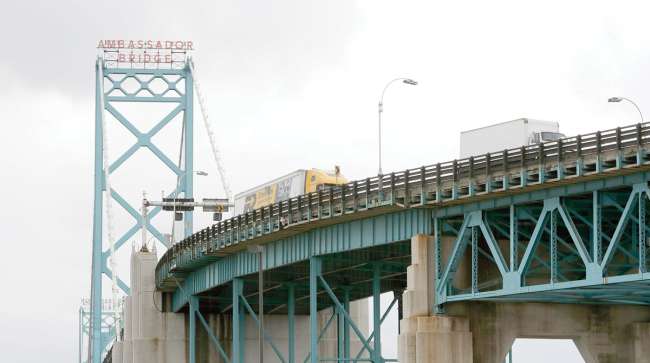Staff Reporter
Michigan to Allow Hazardous Transport on Ambassador Bridge

[Stay on top of transportation news: Get TTNews in your inbox.]
The Michigan Department of Transportation will lift long-standing restrictions on hazardous material transport across Detroit’s Ambassador Bridge on Oct. 29, allowing fuel and certain battery materials to be hauled into Canada.
The decision, repealing the current measures that have been in place since 2014, follows a six-month review of input from the public, law enforcement and first responders.
The 1.5-mile Ambassador Bridge, one of Michigan’s two privately owned border crossings, links Detroit to Windsor, Ontario. Its owner, Detroit International Bridge Co., petitioned MDOT in September 2020 to revise the route restrictions.
In response, MDOT commissioned a study on non-radioactive hazardous material transport across the international freight route. The proposal garnered widespread support, with the majority of 80 letters to MDOT favoring the change, including input from elected officials, business owners and the public.
Transtex CEO Mathieu Boivin discusses the environmental sustainability of auxiliary power units. Tune in above or by going to RoadSigns.ttnews.com.
Joe Vitiritto, CEO of Arkansas-based P.A.M. Transportation Services Inc., endorsed the proposed changes in a December letter to MDOT. The trucking executive, whose company offers truckload, brokerage and logistics services, argued that lifting restrictions would bolster the supply chain in a crucial trade corridor and “substantially reduce” mileage for trucks carrying Class 3 and Class 8 hazardous materials.
P.A.M. Transport ranks No. 54 on the Transport Topics Top 100 list of the largest for-hire carriers in North America.
Border Trade Alliance President Britton Mullen, representing public and private sector members “invested in the sound management of cross-border commerce,” also advocated for the change in a December letter to MDOT. Mullen described the proposal as “a better deal for taxpayers,” projecting an annual reduction of 250,000 truck miles on Michigan roads. This decrease, she argued, would lead to less wear and tear, improved safety and enhanced regional economic competitiveness through more efficient shipping.
RELATED: Michigan DOT Recommends Lifting Hazmat Ban on Ambassador Bridge
Detroit Mayor Michael Duggan supported allowing the vehicles to cross the bridge in November, noting it would lessen truck miles traveled transporting hazardous materials through the city.

Duggan
“4,200 truckloads of liquid petroleum each year leave refineries and fuel terminals in Southwest Detroit and Romulus and drive across the length of Detroit — past the Ambassador Bridge — and through still other Michigan communities to cross at the Blue Water Bridge,” Duggan said.
Once the Ambassador Bridge opens to these materials, thousands of trucks carrying Class 3 (flammable liquids) and Class 8 (corrosive materials) are expected to reroute from the Blue Water Bridge near Port Huron, Mich.
MDOT’s November 2023 study projected that 22% of the annual 32,500 Class 3 shipments and 18% of 17,000 Class 8 shipments moving from the U.S. to Canada through Detroit would shift to the Ambassador Bridge.
To ensure safety, the Detroit International Bridge Co. has installed fire suppression systems and established spill mitigation protocols. Under MDOT’s new approval, restricted materials will be transported only during off-peak hours under vehicle escort supervision.
Want more news? Listen to today's daily briefing below or go here for more info:





